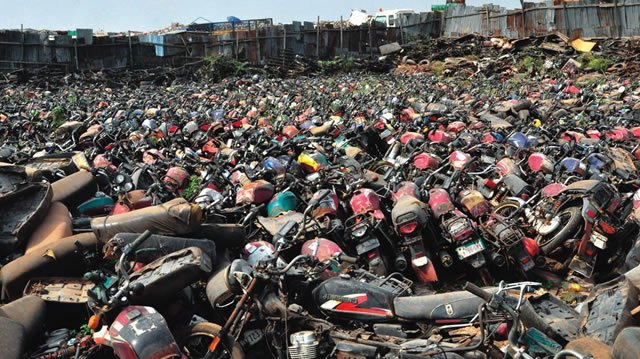EXCITING NEWS: TNG WhatsApp Channel is LIVE…
Subscribe for FREE to get LIVE NEWS UPDATE. Click here to subscribe!
Tackling unemployment was one of the strategic campaign promises on which Nigeria’s President Muhammadu Buhari rode to victory in 2015 when the country’s population was 181 million and unemployment rate stood at 4.3 per cent.
President Buhari had said he would stabilize the naira against the dollar, operate the economy with clear unambiguous regulatory framework and effective enforcement mechanism and create three million jobs annually.
Today, Nigeria’s unemployment rate is estimated to reach 33 per cent and a World Bank report has projected the number of poor persons in Nigeria will rise to 95.1 million in 2022.
The poverty rate in Nigeria was 33 percent in 2014, representing about 58 million of the population. This means that about 37 million more persons have fallen into the poverty in the last seven years, despite the nine million jobs the Buhari-led administration claims it has created.
According to the World Bank report, as many as four in 10 Nigerians live below the national poverty line and only 17 per cent of Nigerian workers hold the wage jobs best able to lift people out of poverty.
“It is clear that much needs to be done to help lift millions of Nigerians out of poverty, including boosting health and education, bolstering productive jobs, and expanding social protection” said Shubham Chaudhuri, World Bank Country Director for Nigeria.
World Bank Lead Economist and co-author of the report Tara Vishwanath, said “Conflict is spreading and intensifying across Nigeria, so it is important to implement programs to support poor and vulnerable Nigerians that are simple and flexible while also limiting the risk of exacerbating fragility and conflict”.
Yet, Nigeria’s Attorney General and Minister of Justice Abubakar Malami, announced on July 21, that the Federal Government was contemplating a nationwide ban on commercial motorcycles popularly called ‘okada’ and temporary suspension of mining activities in the country, to curb insecurity in the country.
Malami explained that motorcycles are the easiest form of logistics used by terrorists and bandits during their operations, while mining activities provide the financial resources.
He noted that the money laundering, prevention, and prohibition act has now made terrorists in the country explore unconventional ways of funding their activities.
“The federal government is now looking at ways to inhibit their actions by blocking the sources already identified,” the minister added.
However, Nigerians across various sectors and groups have continued to criticise the plan which they say would be counterproductive, as it would lead to a spike in both unemployment and poverty rates which are not unconnected to the rising level of insecurity in the country.
The Pan-Yoruba sociocultural organisation Afenifere, said that the proposed action by the federal government was not well thought out.
Spokesperson for the group Jare Ajayi, said: “The plan by the federal government to ban commercial motorcycle and mining activities purportedly to curb insecurity shows that deep or scientific thinking does not characterize how decisions are arrived at in the corridors of power.
“Also, to suppose that banning these activities would put a stop to terrorism is not only a wishful thinking. It amounts to an induced self-delusion that can only complicate the ailment that one is suffering from. Pursuing that line is leaving the substance to chase the shadow.”
In the same vein, an economic working group, Nigeria Economic Security Agenda (NESA) warned that about 20 million jobs were at stake and Nigeria stands to lose N400billon invested in the transportation and mining sectors, if it follows through with the plan.
NESA Convener, Ikenna Emewu, noted that these sectors are key to the economic stability of the country, which in turns guarantees national security.
The mining industry contributes about 0.3% to the GDP and it is expected to grow to an estimated 10% by 2030 if the Nigeria Mining and Mineral Act (NNMA) of 2007 is ably amended.
“In Nigeria, like in any other country, societies with higher unemployment have higher crime rates. Motorcycle for instance, generates employment for millions of Nigerians who are helpless. These come through the value chain.
“The bandits and terrorists use mobile phones to communicate with the families of their victims, so has that made the government to ban the use of mobile phones nationwide?” Emewu wondered.
He stressed that it was unjustifiable for government to punish helpless citizens whose legitimate means of livelihood depend on motorbikes, as scapegoats for its own failings in stemming insecurity.
“For instance, while these problems linger, our security system in the north has still not enforced the registration of motorcycles as done in the southern part of Nigeria. Even around the airport very close to the toll point on the airport road in Abuja, it is common to see motorbikes in their pools all without marks or identification on them or on the riders,” Emewu noted.
An international non-governmental organization working against poverty and injustice worldwide, ActionAid (AAN), has said the job creation efforts of the Buhari-led administration has failed to stem the tide of poverty in the country and called for a robust social safety net in place to buffer the impact of the planned ban.
AAN Communications Coordinator Lola Ayanda, said Nigeria would find it hard to contain crime, criminality and tackle poverty, if adequate alternatives were not implemented before the planned ban.
“The government should encourage investments and job creation to engage those that will lose their livelihoods,” Ayanda advised.
Other experts have recommended that the Federal Government should explore better ways to document and regulate the mining activities and motorcycle operators in the country, instead of an outright ban.
